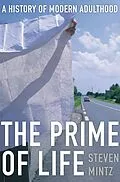"By drawing on 400 years of social and economic history... [the book] presents a thoughtful and thorough guide through the life stages." ( Library Journal)
Adulthood today is undergoing profound transformations. Men and women wait until their thirties to marry, have children, and establish full-time careers, occupying a prolonged period in which they are no longer adolescents but still lack the traditional emblems of adult identity. People at midlife struggle to sustain relationships with friends and partners, to achieve fulfilling careers, to raise their children successfully, and to age gracefully.
The Prime of Lifeputs today's challenges into new perspective by exploring how past generations navigated the passage to maturity. Whereas adulthood once meant culturally-prescribed roles and relationships, the social and economic convulsions of the last sixty years have transformed it fundamentally, tearing up these shared scripts and leaving adults to fashion meaning and coherence in an increasingly individualistic culture.
Emphasizing adulthood's joys and fulfillments as well as its frustrations and regrets, Mintz shows how cultural and historical circumstances have consistently reshaped what it means to be a grown up in contemporary society.
"A triumph of historical writing." The Spectator
"[Mintz's] message that there are many ways to wear the mantle of responsible adulthood and that the 1950s model is a mere blip on history's radar is deeply necessary and long overdue." New York Times Book Review
"Describing the cultural, economic, and social changes from the Colonial era to today's world... Mintzargues that neither religious nor secular middle-class values are adequate responses to the new generation's problems." - Choice
"A thoughtful and strangely encouraging tour of an often difficult life stage." Kirkus Reviews
Autorentext
Steven Mintz is Professor of History at the University of Texas at Austin, Executive Director of the University of Texas System's Institute for Transformational Learning, and the author, most recently, of Huck's Raft: A History of American Childhood.
Zusammenfassung
Adulthood today is undergoing profound transformations. Men and women wait until their thirties to marry, have children, and establish full-time careers, occupying a prolonged period in which they are no longer adolescents but still lack the traditional emblems of adult identity. People at midlife struggle to sustain relationships with friends and partners, to find employment and fulfilling careers, to raise their children successfully, and to resist the aging process.The Prime of Life puts today's challenges into new perspective by exploring how past generations navigated the passage to maturity, achieved intimacy and connection, raised children, sought meaning in work, and responded to loss. Coming of age has never been easy or predictable, Steven Mintz shows, and the process has always been shaped by gender and class. But whereas adulthood once meant culturally-prescribed roles and relationships, the social and economic convulsions of the last sixty years have transformed it fundamentally, tearing up these shared scripts and leaving adults to fashion meaning and coherence in an increasingly individualistic culture.Mintz reconstructs the emotional interior of a life stage too often relegated to self-help books and domestic melodramas. Emphasizing adulthood's joys and fulfillments as well as its frustrations and regrets, he shows how cultural and historical circumstances have consistently reshaped what it means to be a grown up in contemporary society. The Prime of Life urges us to confront adulthood's realities with candor and determination and to value and embrace the responsibility, sensible judgment, wisdom, and compassionate understanding it can bring.
